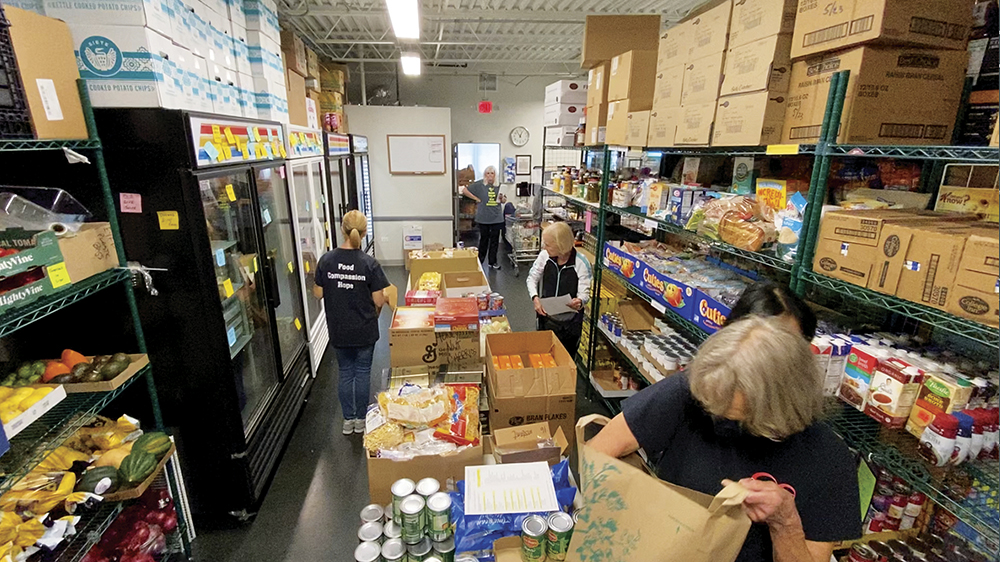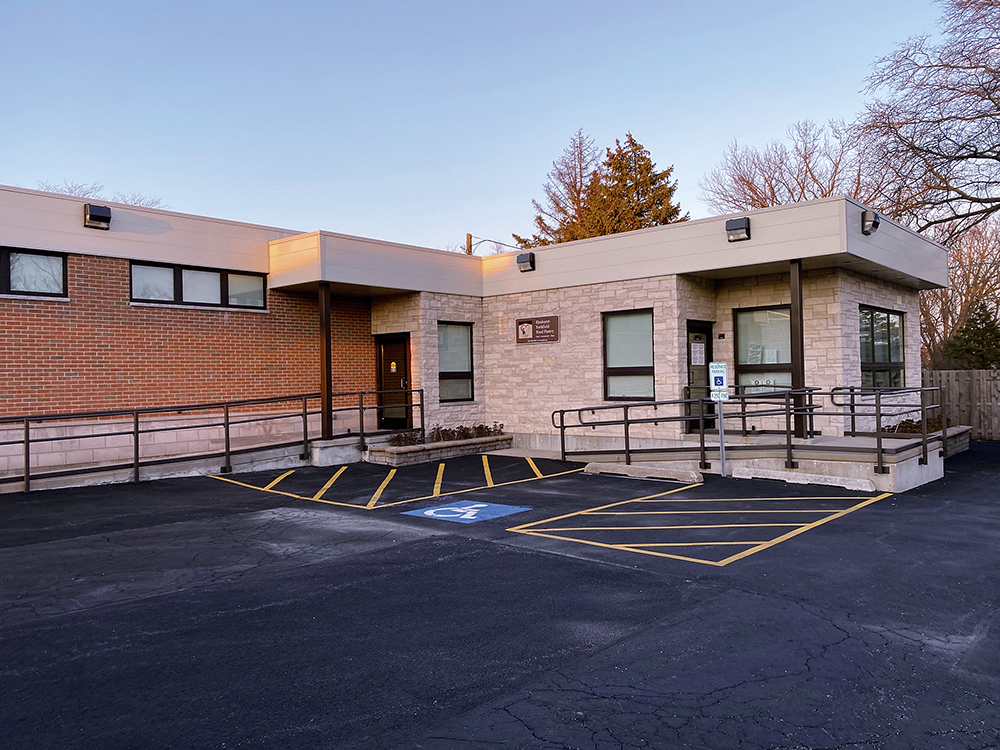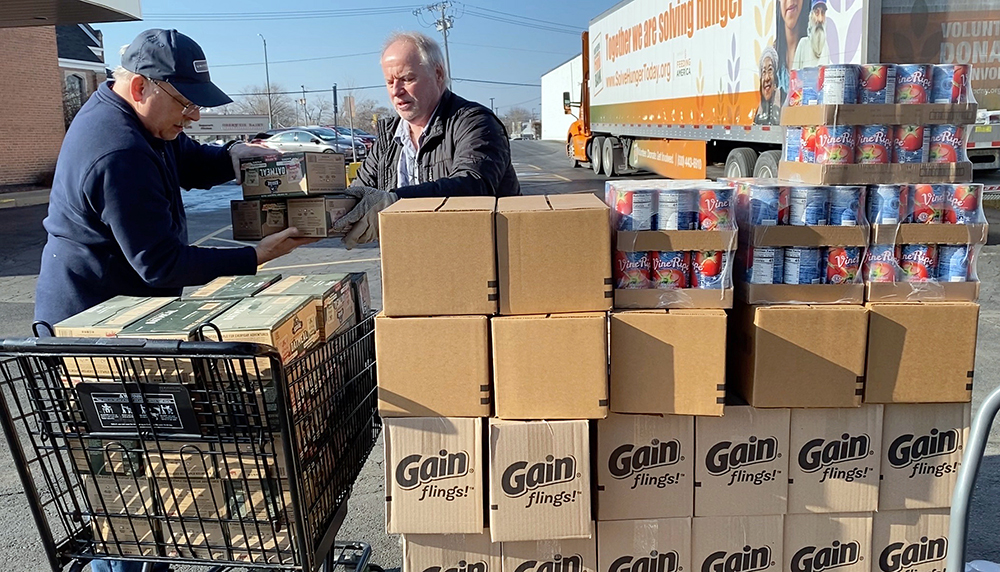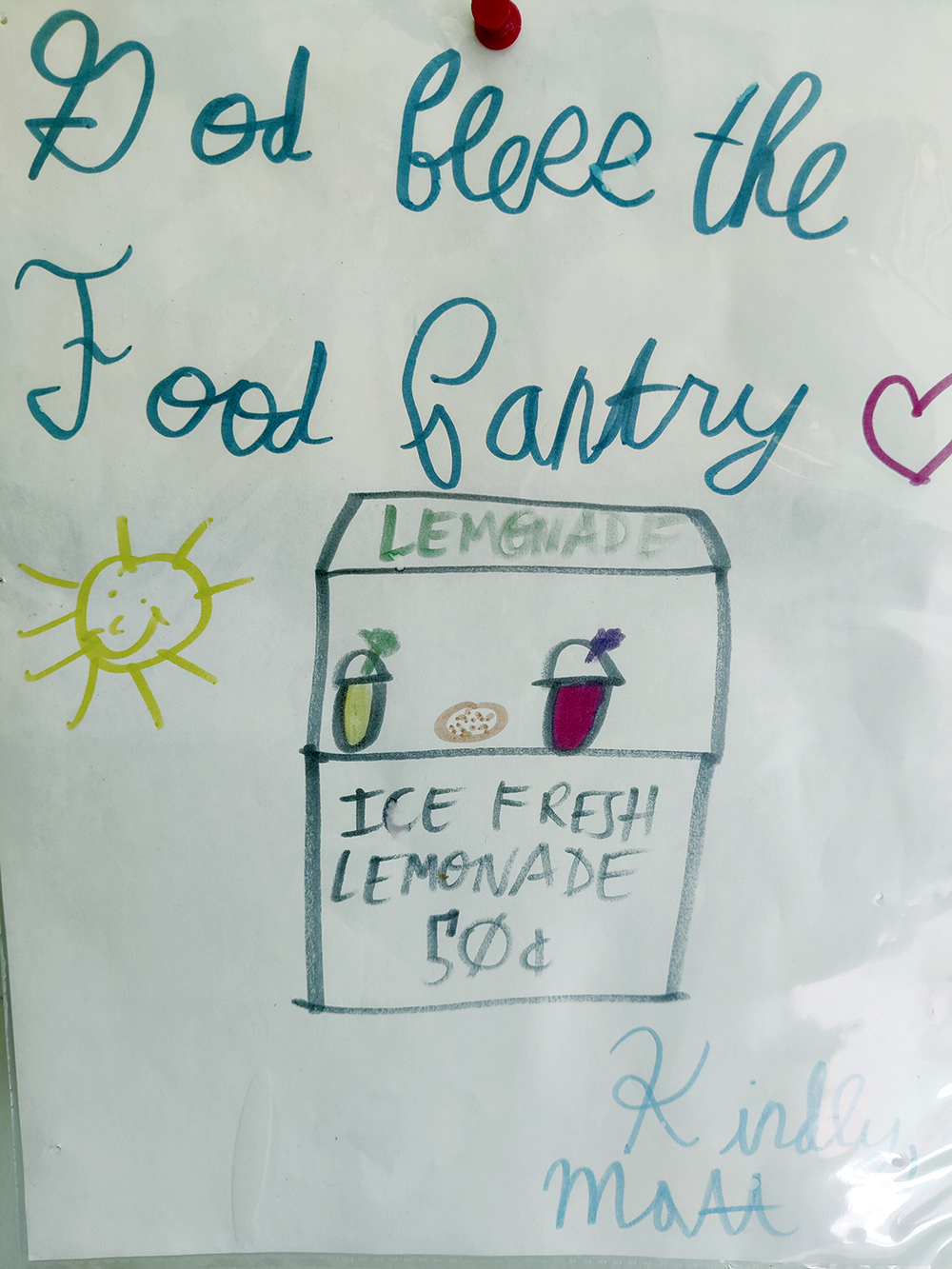Assisting As Needed: Elmhurst-Yorkfield Food Pantry helps families make healthy eating a reality

By Maureen Callahan
Things were different when Kathie Watts started volunteering at Elmhurst Yorkfield Food Pantry (EYFP) 15 years ago. The non-profit began as a ministry of Yorkfield Presbyterian Church. It has come a long way. Volunteers packed canned goods and dry items for pantry patrons from a cinder block room in the church’s basement. Without refrigeration, a dairy component was impossible.
Today, the organization hands out 9,000 gallons of milk annually and 7,000 dozen eggs. Along with dairy products, each family receives food for a week. The 2500-square-foot building opened in 2015 and is a welcoming place where no questions are asked of those experiencing food insecurity.
The layout of the stocked shelves and refrigeration units is a study in organization.
EYFP is there for its clients. Consistently. It’s the only pantry in the area with reliable weekend hours. And not just for food, but other things, too. A pool of about 300 volunteers, about half of whom are regulars, genuinely care for the people who stop by each week. “Sometimes people need someone to talk to,” said EYFP Director Kathie Watts. “We try to be as encouraging and helpful as we can.”

EYFP is located across the parking lot from Yorkville Presbyterian Church.
A few years ago, clients used to visit the pantry and shop, similar to a grocery store experience. Then COVID hit, forcing the organization to pivot to a total client choice model. Clients are given a very detailed shopping list, which can be printed ahead of their visit. The list has literally every category of food item offered on each specific distribution day and constantly changes due to perishable items.
Clients are welcome to choose foods that fit their needs. Special dietary needs, i.e., gluten-free, nut-free, dairy-free, etc., can be accommodated.
Volunteers pull the requested items from the shelves and freezers and bag the order to deliver to a client’s car. “They could be home, with dinner on the table in the time it used to take them to walk through the pantry and serve themselves,” said Watts. “With the new model, we hope they now have more time to reconnect as a family and catch up, and maybe check their children’s homework. It all makes a difference.”
So where does all this food come from? Some finds its way there via the Northern Illinois Food Bank (NIFB) – the parent organization of EYFP. NIFB is also a member of Feeding America, a nationwide non-profit that has built relationships with national brands such as Post, General Mills, and DelMonte. Overruns and “damaged” items from these companies – cans or boxes that are mislabeled, dented, or somehow slightly imperfect, are donated or sold to NIFB at a deep discount. “Whatever NIFB gets free, we get from them free, but if they bought it, we buy it from them at cost,” said Watts.
 Area retail stores often have plenty of perishable items such as fresh fruits and vegetables, breads, and pastries that still have 4 or 5 days before expiration but have a new shipment from the supplier waiting to be shelved. Seven days a week, EYFP sends out a team of dedicated warriors for “food recovery.” While budget monies are always directed at healthy choices, sometimes little extras make their way into the recovery truck.
Area retail stores often have plenty of perishable items such as fresh fruits and vegetables, breads, and pastries that still have 4 or 5 days before expiration but have a new shipment from the supplier waiting to be shelved. Seven days a week, EYFP sends out a team of dedicated warriors for “food recovery.” While budget monies are always directed at healthy choices, sometimes little extras make their way into the recovery truck.
“Our team is at the store so often that the Lays Potato Chip drivers know our guys, so they’ll hand over bags of snacks they’ve had to take off the shelves but would rather not throw away,” said Watts.
Individual donations and those from organized food drives and collections round out the rest of the inventory.
Personal care items, such as shampoo, soap, laundry detergent, and others, are often hard to come by in food banks, but Watts is adamant they are on the shelves. She wants clients to be able to go home, shower, and wash their clothes. “A child with an unkempt appearance isn’t going to raise their hand in class and draw attention to themselves. When they stop raising their hand, they tune out and stop listening.”
It’s all relevant. There’s more to it than providing people with food. Watts and her team understand that. It’s about taking care of the whole person. “We want them to come here instead of the grocery store,” said Watts. “Then go home and pay their electric bill or car payment.”
The number of clients requiring food assistance is up 38% from last year, the busiest since the pantry’s inception. “These are completely normal people who just can’t make ends meet in this economy.”
Numbers have increased exponentially – so much that EYFP will soon be renting a 6,000-square-foot warehouse. The additional space will help store resources waiting for the primary location. It will also provide a staging area for the mobile pantry – a truck carrying food to patrons who cannot come in. “We’ll be able to have everything we need for the mobile pantry under one roof. It will help us serve people better,” said Watts.

Elmhurst-Yorkfield Food Pantry held its first-ever event to celebrate 40 years as a non-profit and raise funds in the process.
EYFP functions much like a small business – but without the income. Every new endeavor brings more expenses with it. Budgets are constantly being monitored, and grants are constantly applied for, with stiff competition to get them. An organization like this requires much fundraising.
This year, EYFP held its first-ever fundraiser to celebrate 40 years of serving the community. Three hundred twenty guests came out to River Forest Country Club to enjoy a buffet dinner and dancing, with raffles and auctions. The evening was rounded out by a former EYFP client who delivered a heartfelt message of thanks to the organization for food assistance while her son was seriously ill.
The evening solidified the idea that no act of kindness is ever lost, regardless of its size.
For more information on food pantry hours, to volunteer, or to make a donation, visit EYFP’s website at eyfp.org. ■

A young person’s gratitude.
